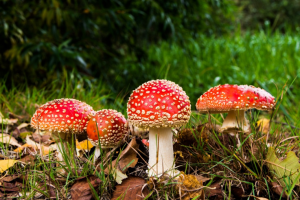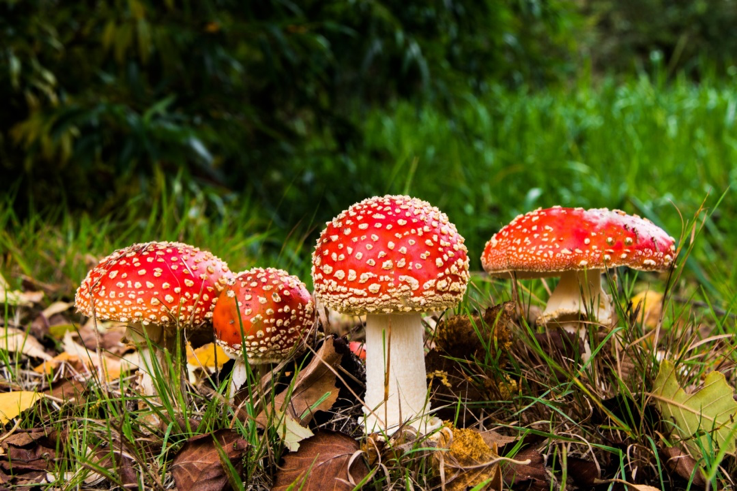This post is also available in Dutch .
What if doctors told you eating magical mushrooms treats cluster headaches, depression and addiction? Their health benefits were once debatable, but now magical mushrooms might be an effective new medication.

WARNING: These are poisonous toadstools. Do not eat. Or suffer the consequences.
Image by PublicDomainPictures.net
What is psilocybin?
Magical mushrooms are also known as psychedelic mushrooms because like other psychedelic drugs (i.e. LSD, peyote, ayahuasca), after you eat these little guys, your sensory and mental state are temporarily altered, leaving you with an experience far from ordinary. The active ingredient found in magical mushrooms is the compound psilocybin, which the body breaks down into psilocin. This is a substance that copies the behavior of serotonin, a neurotransmitter that regulates our mood (check out a previous blog on serotonin). The result of this leads to mind-altering hallucinogenic effects associated with psychedelic mushrooms.
The original use for taking psychedelic mushrooms was for religious purposes, dating back to our ancestors. Then in the 1950s, scientists began testing psilocybin’s influence on mental disorders, problem solving, etc. However due to the growing negative stigma associated with the recreational use of psychedelics, testing stopped once they were made illegal.
In more recent years and under more ethical settings, clinical studies report that psilocybin does indeed have some health benefits, as previously expected. There has been a surge of studies that have reported how it can treat and even prevent cluster headaches, depression, anxiety, and even addictions.
Psilocybin, a possible alternative treatment
In 2006, scientist looked into the accounts of 53 patients that took psilocybin to relieve their cluster headache attacks [1]. Cluster headache is a disorder considered to be the most painful of headaches, the attack being described as “someone putting an icepick through your eye…” The attacks can occur continuously or for periods that can last a week to a year with pauses in between. Half of the patients reported that when they took psilocybin their headache would disappear. No other treatments to date, had ever been reported to stop a cluster headache attack. Nearly half also said that it suppressed their attacks from happening when they took it beforehand, and increased the time between attacks.
A study from 2011, looked into whether it could treat depression and anxiety in the most extreme of cases, advanced-stage cancer patients [2]. Spaced apart by two weeks, twelve patients were blindly given psilocybin in one of two sessions, and a placebo in the other session. Depression decreased by a staggering 30% after the first month of taking psilocybin, and continued dropping steadily for a remaining six months. A similar pattern for anxiety was seen after the first month, and continued to drop even more by the third month.
In 2015, researchers investigated whether psilocybin could help 10 alcoholics abstain from drinking during the month following treatment [3]. After taking the psilocybin, a sharp decline in drinking was observed in especially the week following and continued to decline the following three weeks.
Interested in finding out more?
The psychedelic compound that makes magical mushrooms a hard drug, is now under further and long-awaited investigation. Is your third-eye a little curious? Read the following post to find out what happens inside the brain after taking psilocybin.
Article on how psilocybin treats cluster headaches.
Article on how psilocybin treats depression and anxiety.
Article on how psilocybin treats alcoholism.
Written by Marpessa. Edited by Lara.
References
- Sewell, R. A., Halpern, J. H., & Pope, H. G. (2006). Response of cluster headache to psilocybin and LSD. Neurology, 66(12), 1920-1922.
-
Grob, C. S., Danforth, A. L., Chopra, G. S., Hagerty, M., McKay, C. R., Halberstadt, A. L., & Greer, G. R. (2011). Pilot study of psilocybin treatment for anxiety in patients with advanced-stage cancer. Archives of general psychiatry, 68(1), 71-78.
-
Bogenschutz, M. P., Forcehimes, A. A., Pommy, J. A., Wilcox, C. E., Barbosa, P. C. R., & Strassman, R. J. (2015). Psilocybin-assisted treatment for alcohol dependence: a proof-of-concept study. Journal of Psychopharmacology, 29(3), 289-299.
